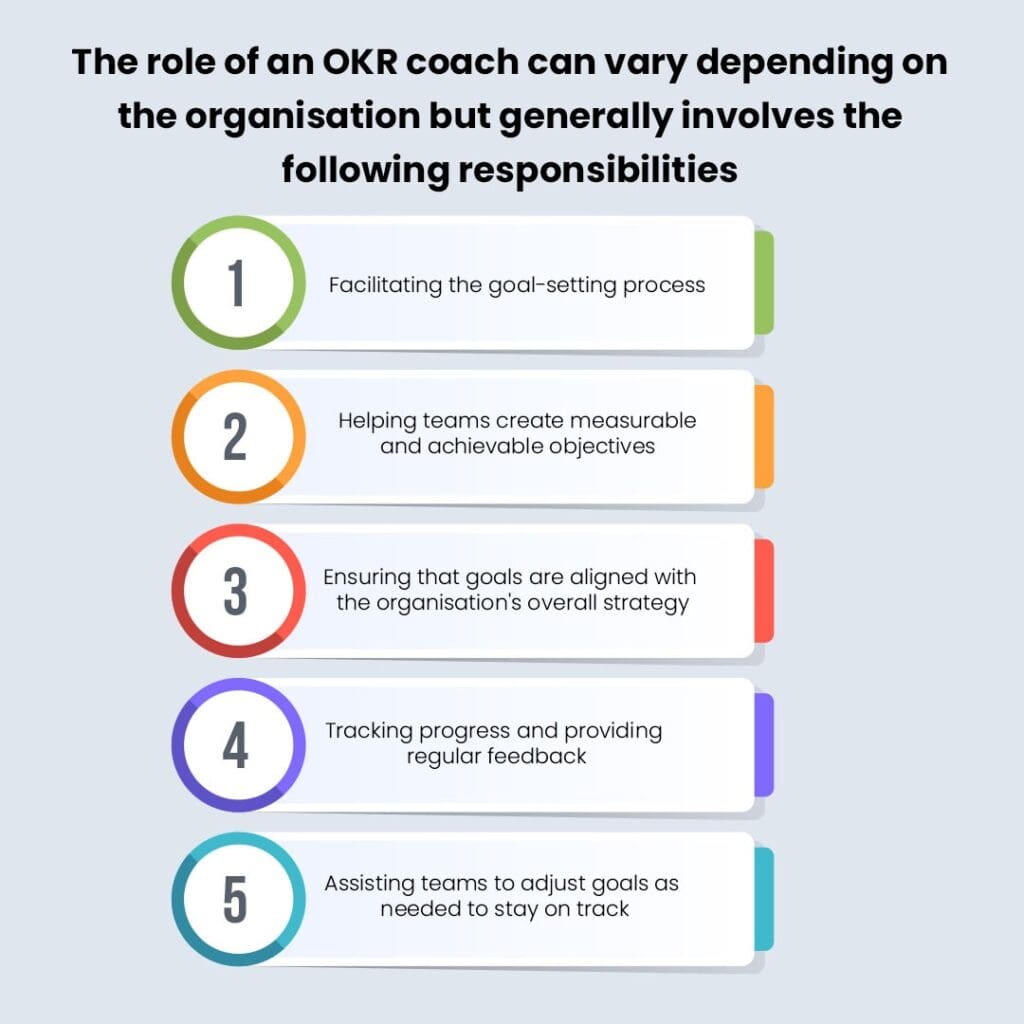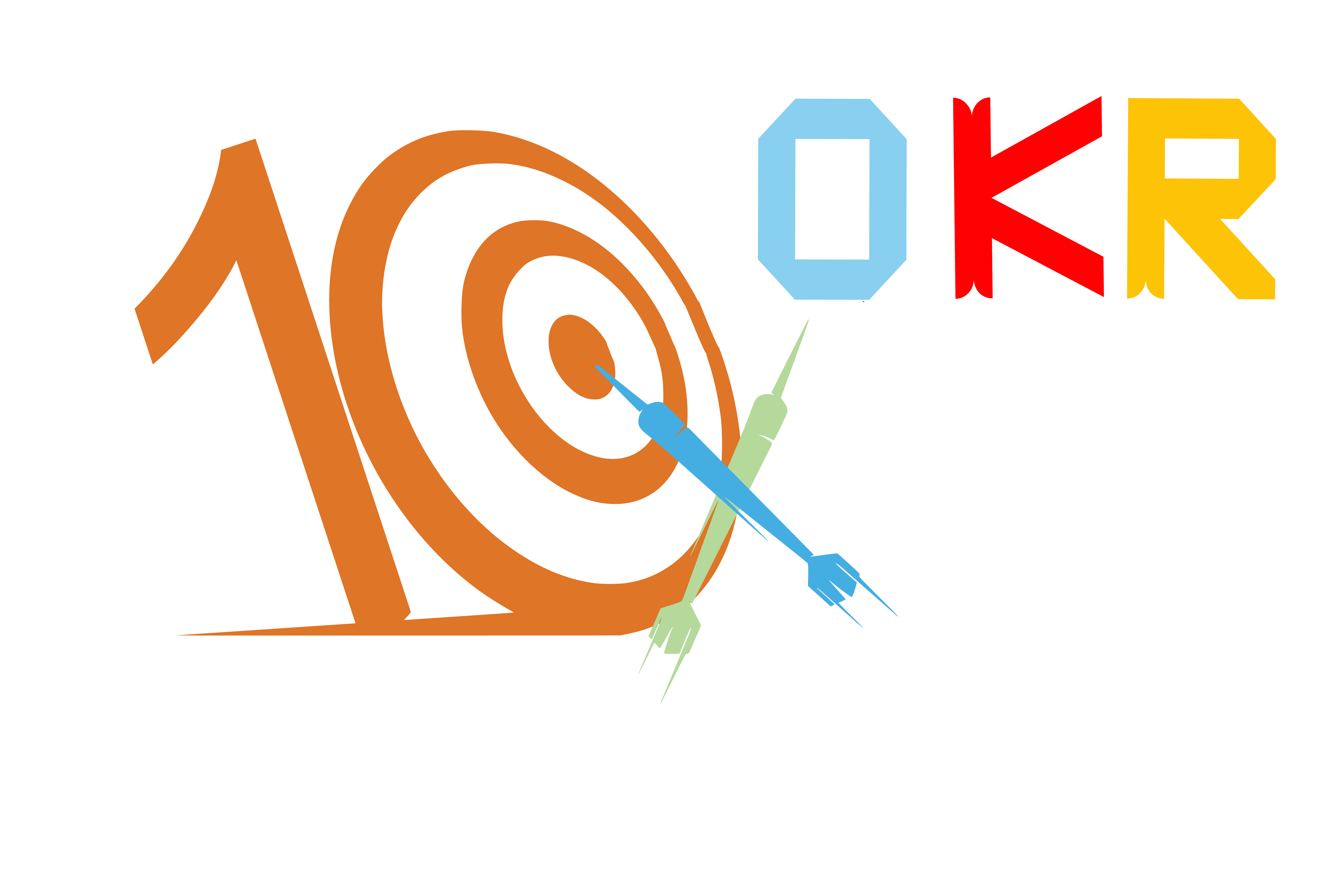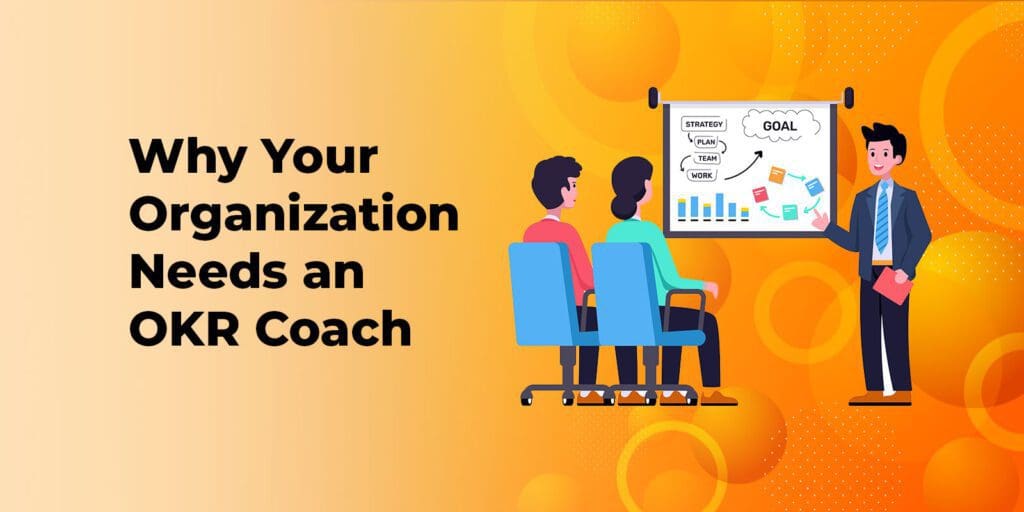Table of Contents
Need an OKR Coach For Growth? Here’s Why!
As businesses grow and evolve, it becomes increasingly important to have a system that helps teams set goals, track progress, and achieve success. This is where Objectives and Key Results (OKRs) come in. OKRs are a popular goal-setting framework embraced by companies worldwide, from small startups to multinational corporations.
While implementing OKRs can be a powerful tool for improving organisational performance, it can also be challenging to do effectively. This is where an OKR coach can be invaluable. In this article, we’ll explore who an OKR coach is, why organisations need them, how to choose the right coach and the benefits of having one on your team.
Who is an OKR Coach?
An expert in helping organisations install and use OKRs successfully is known as an OKR coach. They collaborate closely with teams to establish goals, monitor progress, and ensure everyone is focused on the same goals. They could also provide training and continuing assistance to assist couples in achieving their goals.


What are the Benefits of Having an OKR Coach?
There are many benefits to having an OKR coach on your team. Here are just a few:
Improved Goal-Setting and Goal Achievement
One of the primary benefits of having an OKR coach is that they can help teams set more effective goals. This includes creating specific, measurable, achievable, relevant, and time-bound objectives. By setting goals that meet these criteria, teams are more likely to achieve them, which can improve overall performance.
Increased Employee Engagement and Accountability
OKRs can be a powerful tool for increasing employee engagement and accountability. By setting clear goals and tracking progress, employees are more likely to feel invested in their work and accountable for achieving results. An OKR coach can help teams stay on track, provide regular feedback, and keep everyone engaged.
Enhanced Team Communication and Collaboration
OKRs can also be a powerful tool for improving team communication and collaboration. By setting shared objectives and tracking progress, teams can work more effectively and collaborate more closely. An OKR coach can help facilitate this process and ensure everyone works together towards common goals.
Improved Organisational Alignment and Focus
Finally, OKRs can help improve organisational alignment and focus. By setting objectives that are aligned with the organisation’s overall strategy, teams can ensure that they are working towards common goals. This can improve overall performance and help the organisation achieve its mission.
Help you avoid common pitfalls:
An OKR coach may help you avoid typical problems that might impede the implementation of OKRs, such as establishing improbable targets, failing to have a clear procedure for monitoring progress, or failing to give regular feedback.
Ensure you get the most out of your OKR software:
If you use OKR software, an OKR coach can ensure you get the most out of it by instructing you on how to use it efficiently and assisting you in troubleshooting any issues you run into.
Build a culture of continuous development
inside your company by regularly assessing your goals and objectives and making any necessary adjustments with the support of an OKR coach
How to Choose the Right OKR Coach?
Choosing the right OKR coach is critical to achieving success with OKRs. Here are some factors to consider when selecting an OKR coach:
Look for experience
It’s important to choose an OKR coach who has experience implementing OKRs in various companies and industries. The coach should have a deep understanding of OKR best practices and be able to customise their approach to fit your organisation’s unique needs. A coach with experience can also help you avoid common mistakes and roadblocks that may arise during the implementation process.
Check for credentials
While there is no certification for OKR coaching, some coaches may have completed training programs or have other relevant credentials. These credentials can demonstrate the coach’s commitment to the OKR methodology and their knowledge of best practices. It’s important to note that credentials alone do not necessarily make a good coach, but they can be an additional factor to consider.
Look for a good fit
Your OKR coach should be able to understand your organisation’s goals, challenges, and processes. They should be able to communicate effectively with your team and have a coaching style that aligns with your organisation’s culture and values. Look for a coach who can work collaboratively with your team and adapt to your organisation’s unique needs.
Ask for references
References can provide valuable insight into the coach’s coaching style, success rate, and ability to work with teams. Ask the coach for references from previous clients and reach out to them to better understand their experience with the coach.
Evaluate their coaching approach.
Different coaches may have different approaches to coaching. Some may take a more hands-on approach, while others prefer a more hands-off approach. Understanding the coach’s coaching style and evaluating whether it aligns with your organisation’s needs is important. A good coach should be able to adapt their coaching style to fit the needs of their clients.
Check their availability
Some OKR coaches may have a high demand and may not have the time to work with your organisation. It’s important to understand the coach’s availability and ensure that they have the time and resources to commit to your organisation’s OKR implementation.
Ensure they are a good communicator
Make sure the coach is capable of communicating with you and your squad. An OKR coach needs to be able to do this. They must be able to answer your questions in a concise way, and they must be able to explain OKRs in an easy-to-understand way.
When interviewing potential coaches, here are some questions to ask:
- What is your experience working with organisations like mine?
- What is your approach to OKR coaching?
- What kind of results have you achieved with other organisations?
- What kind of support do you offer after the initial coaching engagement is
OKR Coaching Process
If you want to implement OKRs in your organisation, working with an OKR coach can help you achieve your goals more effectively. The OKR coaching process typically involves four stages: planning, training, implementation, and review.


- During the planning stage, the coach will work with you to develop a customised plan for implementing OKRs that aligns with your strategic priorities. This includes defining clear and measurable objectives and key results, identifying stakeholders, and establishing timelines for achieving your goals.
- Once the plan is in place, the coach will train your teams on the OKR methodology and how to set effective objectives and key results. This training will ensure that everyone in your organisation is aligned and clearly understands the OKR process, which is essential for success.
- After training is complete, the coach will work with your teams to implement OKRs and provide ongoing support as needed. This includes helping you troubleshoot any issues, providing guidance on how to track progress effectively, and making adjustments to your objectives and key results as necessary.
- Finally, the coach will review progress regularly and provide feedback and guidance on improving the OKR program. This includes identifying improvement areas and helping you fine-tune your OKR process over time to achieve better results.
Overall, working with an OKR coach can help you achieve greater clarity, alignment, and accountability when it comes to setting and achieving your goals. By following the OKR coaching process outlined above, you can ensure that your OKR program is optimised for success and delivers real business results.


Success stories of organisations with OKR coaches
Many organisations have seen success with OKRs and OKR coaches. For example, Google, Intel, and Spotify have all implemented OKRs with the help of coaches and have seen significant improvements in goal achievement and organisational alignment.
Google, for example, credits OKRs with helping the company achieve its ambitious goals, such as improving the quality of search results and launching new products like Google Maps and Gmail. OKRs have also helped Google maintain a culture of innovation and experimentation.
Similarly, Intel has seen improvements in employee engagement and accountability since implementing OKRs. The company has also aligned its goals and objectives across different business units and departments.
Spotify has also found success with OKRs, using them to improve communication and collaboration between teams and drive innovation.
To Sum Up
Implementing an OKR system in your organisation is crucial for achieving your goals and maximising your potential. However, with proper guidance and expertise, it can be easier to achieve the desired results. Hiring an OKR coach can give your organisation the necessary knowledge, skills, and guidance to implement and maintain an effective OKR system.
With this knowledge, you can make the most of your business by aligning your team and company with a common goal. Now that you know the benefits, we hope you will consider implementing OKRs into your business today.
FAQs
What are the qualities of a successful OKR coach?
A competent OKR coach is proficient in OKRs, has excellent communication and problem-solving abilities, and can train teams and individuals in using OKRs.
How can you determine the right okr coach for your organisation?
- Get references from coworkers or other businesses.
- Search online for OKR coaches.
- Ask potential OKR instructors if they would fit your business well.



